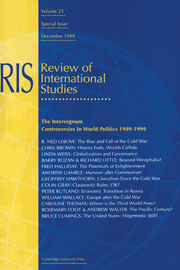Book contents
- Frontmatter
- Contents
- Acknowledgements
- Foreword
- Notes on contributors
- Introduction
- 1 The Rise and Fall of the Cold War in Comparative Perspective
- 2 History Ends, World Collide
- 3 Globalization and National Governance: Antinomies or Interdependence?
- 4 Beyond Westphalia?: Capitalism after the ‘Fall’
- 5 The Potentials of Enlightenment
- 6 Marxism after Communism
- 7 Liberalism Since the Cold War: An Enemy to Itself?
- 8 Clausewitz Rules, OK? The Future is the Past—with GPS
- 9 Mission Impossible? The IMF and the Failure of the Market Transition in Russia
- 10 Europe after the Cold War: Interstate Order or post-Sovereign Regional System?
- 11 Where is the Third World Now?
- 12 Whatever Happened to the Pacific Century?
- 13 Still the American Century
- Index
8 - Clausewitz Rules, OK? The Future is the Past—with GPS
Published online by Cambridge University Press: 05 November 2009
- Frontmatter
- Contents
- Acknowledgements
- Foreword
- Notes on contributors
- Introduction
- 1 The Rise and Fall of the Cold War in Comparative Perspective
- 2 History Ends, World Collide
- 3 Globalization and National Governance: Antinomies or Interdependence?
- 4 Beyond Westphalia?: Capitalism after the ‘Fall’
- 5 The Potentials of Enlightenment
- 6 Marxism after Communism
- 7 Liberalism Since the Cold War: An Enemy to Itself?
- 8 Clausewitz Rules, OK? The Future is the Past—with GPS
- 9 Mission Impossible? The IMF and the Failure of the Market Transition in Russia
- 10 Europe after the Cold War: Interstate Order or post-Sovereign Regional System?
- 11 Where is the Third World Now?
- 12 Whatever Happened to the Pacific Century?
- 13 Still the American Century
- Index
Summary
The confessions of a neoclassical realist
In 1972, Hedley Bull wrote that ‘the sources of facile optimism and narrow moralism never dry up, and the lessons of the “realists” have to be learnt afresh by every new generation.’ He proceeded to claim, with undue emphasis, that ‘in terms of the academic study of international relations, the stream of thinking and writing that began with Niebuhr and Carr has long run its course.’ The scholarly problems with classical realist theory are indeed severe. However, it would be a most grievous error to consign such theory to the bin marked ‘yesterday's solutions for yesterday's problems.’ If the academic study of international relations can find little save period-piece interest in the ideas of the classical realists, that is more a comment upon the competence of scholarship today than upon any change in world conditions.
There is much well worth criticizing in the classically realist theory of international relations and what was once eponymously called statecraft. Any scholar worthy of his or her BISA membership could organize and deliver a sparkling module on the theme of ‘Classical Realism: Sins of Omission, Errors of Commission, and Flagrant Ambiguities.’ Many of us have bored first-year tutorials with our skilful skewering of balance-of-power theory, the concept of power, and—of course—the national interest. The problem is that with our intellectual rigour all too often we correct the grammar but lose the plot. I will argue that flawed though the principal texts of classical realism may be, when compared with more contemporary would-be master/mistress-works, they have an overriding virtue.
- Type
- Chapter
- Information
- The Interregnum: Controversies in World Politics 1989–1999 , pp. 161 - 182Publisher: Cambridge University PressPrint publication year: 2000

